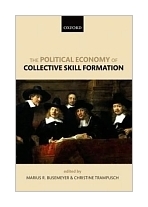|
||
• wydawnictwa polskie
• Zamów informacje o nowościach z wybranego tematu • kontakt
• Cookies na stronie |
THE POLITICAL ECONOMY OF COLLECTIVE SKILL FORMATIONBUSEMEYER M.R. TRAMPUSCH C.wydawnictwo: OXFORD UP , rok wydania 2011, wydanie Icena netto: Education, skill formation, and training continue to be important areas of consideration for both public policy and research. This book examines the particular types of vocational training known as collective skill formation systems, whereby the training (often firm-based apprenticeships) is collectively organized by businesses and unions with state support and cooperation in execution, finance, and monitoring. With contributions from leading academics, this book is the first to provide a comprehensive analysis of the varying historical origins of, and recent developments in, vocational training systems, offering in-depth studies on coordinated market economies, namely Germany, Austria, Switzerland, the Netherlands, and Denmark. It also contains comparative chapters that analyse how these countries react to common challenges such as deindustrialization, labour market stratification, academic drift, gender inequalities, and Europeanization. Whereas previous research has focused on the differences between various kinds of skill regimes, this book focuses on explaining institutional variety within the group of collective skill formation systems. The development of skill formation systems is regarded as a dynamic political process, dependent on the outcome of various political struggles regarding such matters as institutional design and transformations during critical junctures in historical development. Marius R. Busemeyer is a Professor of Political Science and head of an Emmy Noether research group at the University of Konstanz. Prior to this, he was a senior researcher at the Max Planck Institute for the Study of Societies in Cologne. His research focuses on the comparative political economy of education regimes and welfare states, public spending, individual social policy preferences, and theories of institutional change. Christine Trampusch is currently Assistant Professor of Comparative Politics at the University of Berne. Starting in July 2011, she will be Professor of Comparative Political Economy and Economic Sociology at the University of Cologne. Her research centers on the study of the origins and changes of welfare states, industrial relations, and skill formation systems, in a historical and comparative perspective. Table of Contents Foreword 1. Introduction: The Comparative Political Economy of Collective Skill Formation, Marius R. Busemeyer, Christine Trampusch Section I: Country Studies 2. Vocational Training and the Origins of Coordination: Specific Skills and the
Politics of Collective Action, Cathie Jo Martin Section II: Crosscutting Topics and Contemporary Challenges 8. Collective Skill Systems, Wage Bargaining, and Labor Market Stratification,
Marius R. Busemeyer, Torben Iversen 380 pages, Hardcover Księgarnia nie działa. Nie odpowiadamy na pytania i nie realizujemy zamówien. Do odwolania !. |


